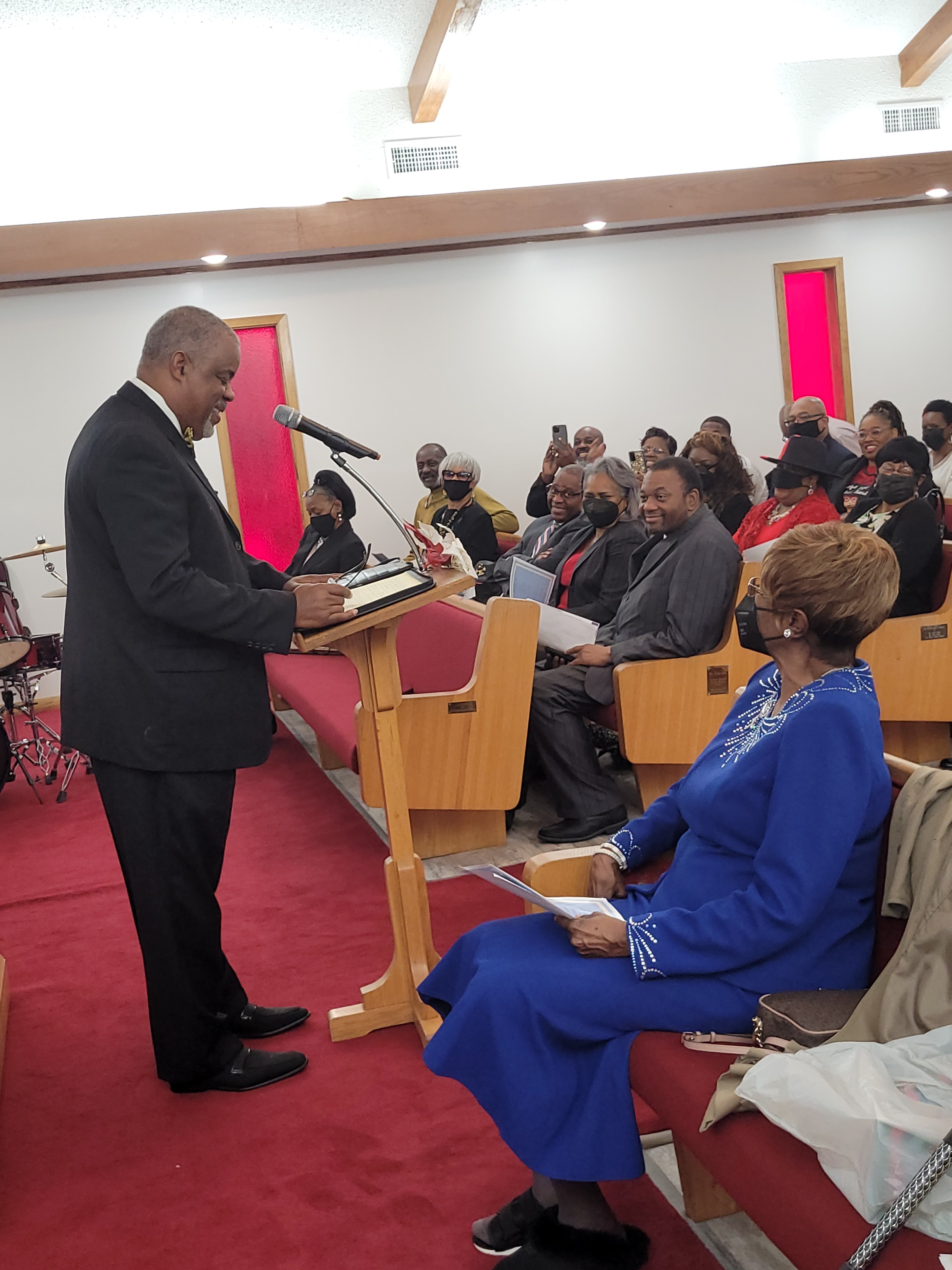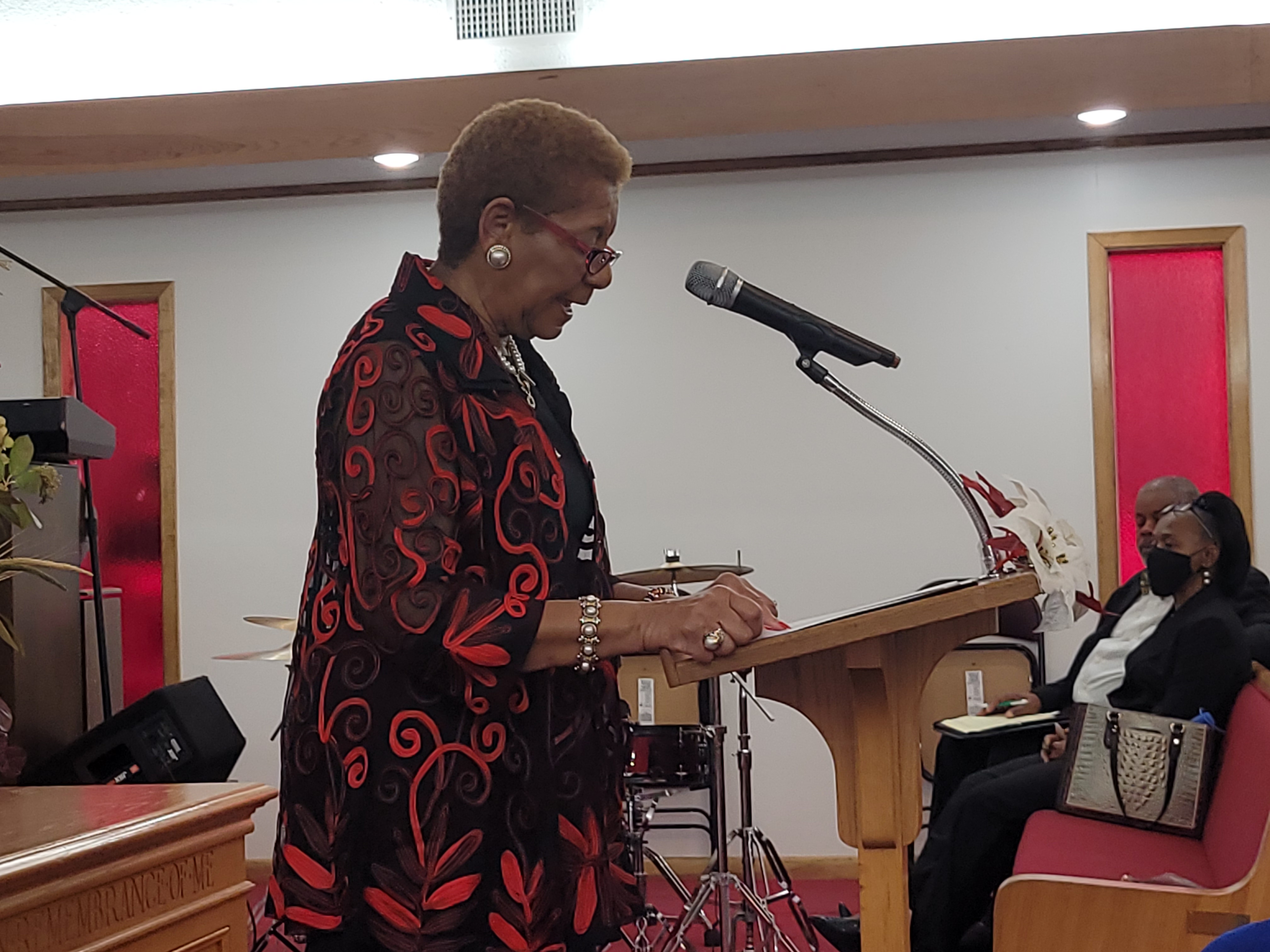Historical insight and illuminating revelation of the Emancipation Proclamation were the focus of a special program presented Monday by the Pine Bluff branch of the NAACP.
About 200 people gathered at Eighth Avenue Missionary Baptist Church in Pine Bluff to learn about this presidential proclamation and executive order signed by President Abraham Lincoln on Sept. 22, 1862. The proclamation was issued Jan. 1, 1863, during the Civil War.
The audience was visibly moved and joined in singing as Eighth Avenue Missionary Baptist Church's Praise Team presented several spirited selections including "Lift Every Voice and Sing," "God's Got a Blessing" and "Hallelujah, Salvation and Glory."
Outgoing Pine Bluff Branch NAACP President Wanda V. Neal acknowledged the local branch's executive committee members as well as elected officials, pastors, law enforcement officials and community leaders. She thanked Pastor Kirby L. Gulley for the use of Eighth Avenue Missionary Baptist Church. She also presented a President's Award to Dr. Arlene Woody.
"Initially, the Emancipation Proclamation effectively freed only a small percentage of slaves, namely those who were behind Union lines and areas not exempted," said Dorothy J. Oliver, who served as secretary for the Pine Bluff Branch of the NAACP from 2016 to 2022. "Most slaves were still behind Confederate lines or in exempted Union-occupied areas."
She also shared the fact that the proclamation allowed for the enlistment of freed slaves into the United States military.
"During the war, nearly 200,000 Black men joined the Union Army. Their contributions were significant in winning the war," Oliver said.
On New Year's Eve in 1862, African Americans -- both slave and free -- gathered across the United States to hold Watch Night ceremonies for "Freedom Eve." They looked toward the stroke of midnight and the promised fulfillment of the proclamation, Oliver said.
There is "controversy over the actual purpose of the Emancipation Proclamation" as to whether the main goal was to free slaves, she stated. "Dr. Martin Luther King Jr. made many references to the Emancipation Proclamation during the civil rights movement of the early 1960s."
Oliver quoted a portion of King's "I Have a Dream" speech:
"Five score years ago, a great American, in whose symbolic shadow we stand today, signed the Emancipation Proclamation. This momentous decree came as a great beacon light of hope to millions of Negro slaves who had been seared in the flames of withering injustice. It came as a joyous daybreak to end the long night of their captivity.
"But 100 years later, the Negro still is not free. One hundred years later, the life of the Negro is still sadly crippled by the manacles of segregation and the chains of discrimination."
Pine Bluff Mayor Shirley Washington, who was the keynote speaker, referenced the United States Constitution's opening lines as "wise and profound acknowledgement of human limitation."
"We the people of the United States, in order to form a more perfect union ... do ordain and establish this Constitution for the United States of America," she read.
Washington said the words "in order to form a more perfect union" are a "candid confession of America's imperfect start. It affirms what many of us already know: The work of creating a better republic would be ongoing. The full promise of our country -- 'liberty and justice for all' -- was not yet realized at its inception."
At the time Lincoln signed the proclamation, more than 4 million Black men and women were living in slavery.
"Some of those liberated by the proclamation were kept in the dark for many years," Washington said. "More than 250,000 people in Texas, for example, remained in slavery until June 19, 1865, when Union soldiers arrived and informed them of their liberation."
Even though Lincoln "abhorred slavery," he did not issue the proclamation to "permanently abolish slavery in America," Washington said. "It couldn't enshrine federal protections against slavery without the support of the American people through a constitutional amendment. Additionally, the proclamation couldn't prevent racial segregation or the wave of Jim Crow cruelty that would sweep the South. And the proclamation couldn't equip Black Americans with the resources we needed to heal from the damage that had been afflicted upon us through slavery and racism."
With 160 years passing since the proclamation went into effect, lessons gleaned from this document "are both humbling and moving," she said.
Washington encouraged the audience to appreciate the proclamation's significance and celebrate the opportunities it created.
"It laid the groundwork for subsequent triumphs in the pursuit of racial equality. But its nuance left uncompleted work -- much like the Constitution itself. In this reality, we learned that the road to liberating our people goes deeper than breaking physical chains. We learned that even though we may garner some triumphs along the way, we're not free until we're all free," Washington said.
She commended the founders of the NAACP for knowing that ultimate freedom "must spawn from the actions and consent of we the people. They used the transformational power that lives within the people to elevate condition and break barriers of people of color."
"Our ability to have homes, to go to school and send our children to college, to vote and not be considered property under the law -- these are victories that have been secured with blood, sweat and tears of organizations led by the NAACP," Washington said.
Despite the accomplishments, the work remains incomplete.
"We're waiting on emancipation from violence that strikes our community in various shapes ... we're waiting on emancipation from a failing education system ... we're also waiting on emancipation from health disparities," she said.
"The key to exercising power is making sure our votes are counted. The NAACP is essential to not only getting more people registered to vote, but also getting them to the polls," she said.
Washington encouraged the audience not to give up.
"This is a time for bold leadership by everyone in this room. We need you. We need the NAACP energized, proactive and standing on the front lines," she said.
At the end of the program, Ivan Whitfield was sworn in by Judge Earnest Brown Jr. as the new president of the Pine Bluff branch of the NAACP. Executive committee members of the Pine Bluff branch were also sworn in, including Neal, Oliver, Woody, Mary Liddell (first vice president), Janice L. Roberts, Tina Owens, Gloria Tillman, Yvonne Humphrey and Flora Cook Bishop.
Tommy Daniels, the Arkansas State NAACP president, gave special greetings. He praised the hard work and efforts of the Pine Bluff branch.
"Nothing could survive this long if no good work was coming out of it," Daniels said. "We're all doing a good job."



